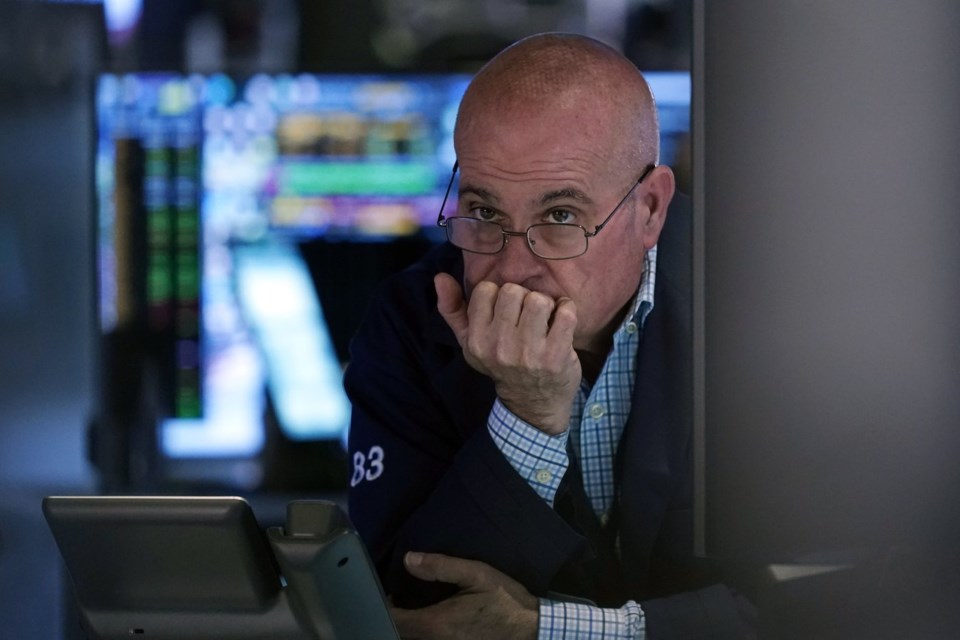NEW YORK (AP) — Stocks ended mostly higher on Wall Street, closing out the market’s latest winning month. The S&P 500 shook off a midday slump and ended 0.8% higher Friday. Drops for Nvidia and other technology stocks held back the Nasdaq composite, leaving that index just barely in the red. The Dow Jones Industrial Average climbed 1.5%. Treasury yields eased in the bond market after a key measure of inflation remained steady last month. That could help bolster the Federal Reserve’s confidence that inflation is sustainably heading down toward its target, something the central says it needs before cutting its benchmark interest rate.
THIS IS A BREAKING NEWS UPDATE. AP’s earlier story follows below.
NEW YORK (AP) — Most U.S. stocks rose Friday after a report showed inflation is at least not worsening, but drops for some big technology stocks kept indexes in check.
The S&P 500 was down 0.1% in afternoon trading and on track to close its first losing week in the last six, even though the majority of stocks within the index rose for the day. The drops for technology stocks dragged the Nasdaq composite to a market-leading slide of 0.9%, with a little more than a half-hour remaining in trading. But the Dow Jones Industrial Average, which has less of an emphasis on tech, rose 285 points, or 0.7%.
Dell tumbled 17.9% even though the tech company matched analysts’ forecasts for profit in the latest quarter. Its stock had already soared 122% in 2024 ahead of the report, meaning expectations were very high, and analysts pointed to concerns about how much profit Dell is squeezing out of each $1 in revenue.
Nvidia fell for a second straight day, losing 1.1%, as its momentum finally slows after soaring more than 20% since its blowout profit report last week. The chip company was the heaviest weight on the S&P 500 Friday outside of Microsoft’s 1.7% drop and Amazon's 2.5% fall.
Stocks outside of tech were stronger after the latest reading on inflation came in roughly as expected. That left open the question of when Wall Street will get the lower interest rates that it craves.
Relief came from easing Treasury yields in the bond market, which erased gains made earlier in the week that hurt the stock market. The report showed a key measure of inflation remained at 2.7% last month, exactly as forecast. Some underlying trends improved by a touch more than expected.
That could bolster the Federal Reserve’s confidence that inflation is sustainably heading down toward its target, something it says it needs before it will cut its main interest rate.
The Fed has been keeping the federal funds rate at the highest level in more than 20 years in hopes of slowing the economy enough to stifle high inflation. But if it holds rates too high for too long, it could choke off the economy’s growth and cause a recession that throws workers out of their jobs and craters profits for companies.
“The pickle for the Fed is whether growth will slow faster than inflation,” said Brian Jacobsen, chief economist at Annex Wealth Management. “We’ve gone from great growth to slower growth pretty quickly. The road to lower inflation has been like a joyride so far, but the last mile will be more challenging.”
Friday’s report from the U.S. government showed that growth in spending by consumers weakened by more than economists expected. Growth in incomes for Americans also slowed last month.
The numbers show businesses “need to prepare for an environment where consumers are not splurging like they were last year,” according to Jeffrey Roach, chief economist for LPL Financial.
After the report, the yield on the 10-year Treasury fell to 4.50% from 4.55% late Thursday. It topped 4.60% earlier this week amid worries about tepid demand following some auctions for Treasurys.
The two-year Treasury yield, which more closely tracks expectations for Fed action, slipped to 4.88% from 4.93% late Thursday.
Virtually no one expects the Federal Reserve to cut interest rates at its next meeting in less than two weeks. But traders are betting on an 84% probability that it will cut at least once by the end of the year, according to data from CME Group.
Stocks in industries that tend to benefit the most from easier interest rates helped lead the market Friday. Real-estate stocks in the S&P 500 jumped 1.4% as a group for one of the biggest gains of all 11 sectors that make up the index. Boston Properties rose 3.6%.
Gap leaped to one of the market’s biggest gains, 28.7%, after delivering stronger profit and revenue for the latest quarter than analysts expected. The parent company of Old Navy and Banana Republic reported growth across its brands, reversing earlier declines at most of them. The retailer also raised its forecasts for sales and profitability this year despite saying the outlook for the economy remains uncertain.
MongoDB lost about a quarter of its value, 25.5%, despite topping forecasts for profit and revenue. The database company for developers gave forecasts for profit in the current quarter and for this full year that fell short of analysts’ expectations.
Trump Media & Technology Group went from an initial gain to a slump of 6% in its first trading following the conviction of Donald Trump on 34 felony charges Thursday. The company, which runs the Truth Social platform, had earlier warned in filing with U.S. securities regulators that a conviction of Trump could hurt it.
In stock markets abroad, indexes were mixed across Asian and Europe. Tokyo’s Nikkei 225 rose 1.1%, while Hong Kong’s Hang Seng fell 0.8%.
__
AP Business Writers Matt Ott and Elaine Kurtenbach contributed.
Stan Choe, The Associated Press

